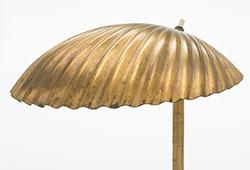A silver Japanese silver set, Miyamoto Shoka, Tokyo, early 20th Century. (10 pieces)
Some parts with an inscription "Ebba-Stina Kiku 1 år (year)". Coprising; Two clothing brushes, length 14.5-17 cm. A mirror, length 26,5 cm. A hairbrush, length 22 cm. An inkstand on a tray, height 7 cm, dish 10x10 cm. A tray, length 19 cm. A gloveassistant, lenght 19 cm. A shoehorn, lenght 21 cm. A comb, lenght 20 cm.
Dents. Wear.
Alkuperä - Provenienssi
From the Collection of Ebba-Stina Kiku Gadelius (1916-2022), thence by descent.
The foundation of the collection was laid by her father Knut Gadelius (1864-1932), who founded the Gadelius company.
Ebba was the third child of Knut Gadelius, she was born in Tokyo and grew up in Japan. She herself had a career as an artist and textile designer both in the USA and France and her design and art was strongly influcenced by her early years in Japan. The black and white image shows her (girl in white coat to the left) and her siblings and nannys on a trip to the Big Buddha.
Kirjallisuus
Miyamoto Shoko was established in 1880, initially offering tobacco cases aimed at the foreign market, and ‘zoukan’ silver inlay frames – before broadening its product range. Prioritising works in silver of high quality and durability, Miyamoto Shoko found early admirers among foreign resident merchants and diplomatic presences in the Tokyo environs. Also among the Imperial family, who granted the Royal warrant that Miyamoto Shoko retains today. Their work adorns the table at the royal guesthouse, and the banquets held for visiting dignitaries.














































